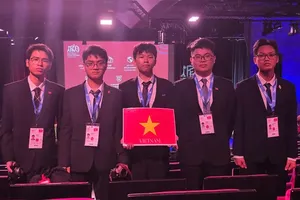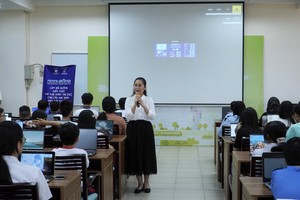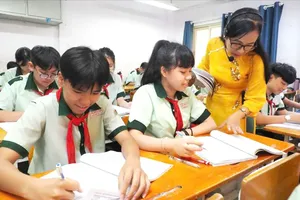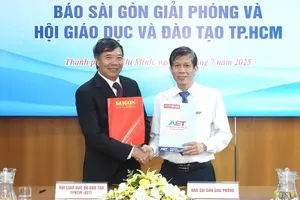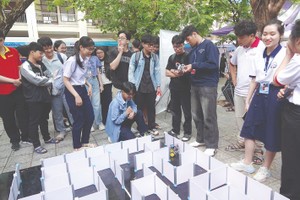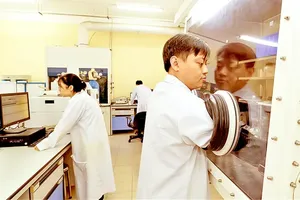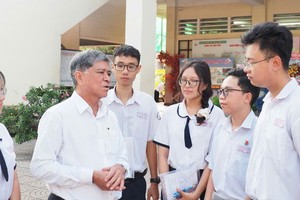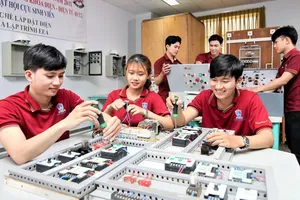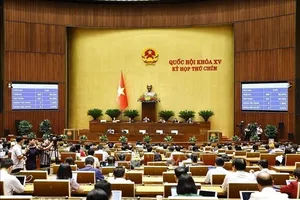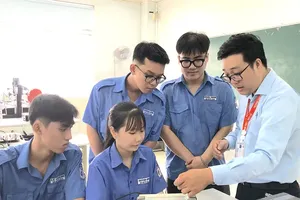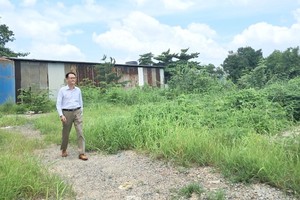 |
Lai Xuan Mon, Standing Deputy Head of the Party Central Committee’s Commission for Propaganda and Education speaks at the meeting |
The Central Propaganda and Education Commission, the City Party Committee of Ho Chi Minh City and the National University of Ho Chi Minh City today jointly organized a national scientific conference themed ‘Policies for attracting, training and fostering scientific and technological intellectuals in the new context’.
Lai Xuan Mon, Standing Deputy Head of the Party Central Committee’s Commission for Propaganda and Education; Le Quang Huy, Chairman of the National Assembly's Committee on Science, Technology and Environment; Huynh Thanh Dat, Minister of Science and Technology; Phan Van Mai, Standing Deputy Secretary of the City Party Committee, Chairman of the People's Committee of Ho Chi Minh City; Vu Hai Quan, President of Vietnam National University, Ho Chi Minh City chaired the conference.
At the seminar, Chairman of the Ho Chi Minh City People's Committee Phan Van Mai affirmed that Ho Chi Minh City leaders are clearly aware of the decisive role of intellectuals in the city’s development. He expressed his appreciation for the active contribution of intellectuals who have helped Ho Chi Minh City maintain its leading role and develop day by day.
According to Chairman Phan Van Mai, Ho Chi Minh City has not exploited the potential of intellectuals despite having all favorable conditions such as connectivity, a system of institutions, economic and financial conditions, and a market where researches can be immediately applied. What hinders is the policy and mechanisms to gather, connect and promote intellectuals.
The Chairman added that in the past time, Ho Chi Minh City has had many policies to attract intellectuals to work at agencies, but the policies focused on wages, accommodation and travel conditions. After a time, the southern largest city only attracted about 20 experts. The policies of Ho Chi Minh City have not been able to approach and motivate experts and intellectuals.
Associate Professor Vu Hai Quan, Director of Vietnam National University in Ho Chi Minh City, acknowledged that in the past 15 years, intellectuals have been making important contributions to the country’s socio-economic development, ensuring national security and defense.
However, in the field of science and technology, the number of researchers per ten thousand people is still low compared to other countries in the region. According to statistics from the Ministry of Science and Technology, the number of research personnel per 10,000 population in Vietnam ranged at 15.6. In particular, the number of researchers with doctoral degrees is still very low, with a total of nearly 30,000 people.
Moreover, science and technology training has not been closely linked to the socio-economic development strategy. In particular, the number of admissions is uneven across industry groups, with a downward trend, especially among postgraduates. Statistics from the Ministry of Education and Training show that the number of Ph.D. students in these majors has continuously decreased in the last 3 years.
Accordingly, there were 1379 Ph.D. students in 2019 but it was only 1,010 Ph.D. students in 2021. The number of student enrolments in the information technology majors has continuously increased, from 46,173 students in 2019 to 56,260 students in 2022 whereas student enrolment in the natural sciences and life sciences is just 50 percent of the admission quota.
In particular, there was no student enrolment into several majors such as oceanography and geology. The total enrollment of these major groups is less than 30 percent of the total number of students. Meanwhile, the ratio of state budget spending on higher education is very low, reaching only 0.25 percent - 0.27 percent of GDP, while this rate in other countries in the region is 0.6 percent.


